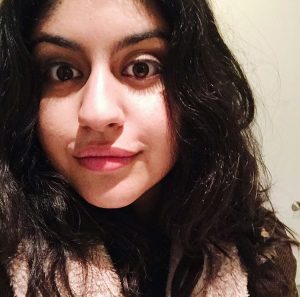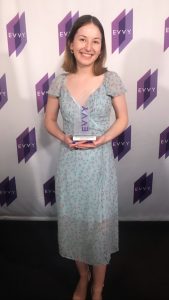Emerson Entrepreneurs Aim for Sustainability, Empowerment in E3 Expo
A 3D printed prototype for Hear Buddies. Courtesy photo
By David Ertischek ’01
A special effects makeup studio, a cannabis-based hookah, a smart punching bag, environmentally-friendly mushroom leather — these are just a few of the student ideas for proposed companies to be showcased at the E3 Expo on Friday.
The E3 Expo is the culmination of the yearlong Entrepreneurial Studies and Business Studies program. At the expo, students will provide a five-minute pitch to four judges who will grade each presentation using a criteria of 10 categories, including sustainability, innovation, and more.
The judges will award a $5,000 award to first place, $3,000 for second place, $2,000 for third place. Students will also be awarded the Karl Baehr Memorial Scholarship Award for $1,500, and the Clemens Social Enterprise Award for $1,000. Students in the program will also select a peer to win the E3 Entrepreneurial Spirit Award.
Lu Ann Reeb, Director of the Entrepreneurial Studies and Business Studies program, said the E3 Entrepreneurial Spirit Award is her favorite. “The students choose the most supportive, entrepreneurial thinker who’s given feedback and helped them along the way by being an energetic cohort.”
One of the most out-of-the-box student venture ideas is Rooted Textiles, which would be a company that produces environmentally friendly leather made from mushrooms. The company is the brainchild of Eileen Polat ’21.

“It’s a [business-to-business] selling wholesale to companies,” said Polat, a Marketing Communication major. “Mushroom leather has been created in the past. It’s another sustainable textile that has been on the market for a long time. It’s an alternative to animal leather.” Polat is a big supporter of sustainability, as she has made her own clothes since she was in high school, or bought secondhand items.
“I originally wanted to go to fashion school, but I changed my mind and went to Emerson. I’ve been following the fast fashion industry and what’s been sold in mass to consumers. I’ve seen an insane effect on the environment,” said Polat, citing that more than 20 billion pounds of clothing ends up in landfills every year. “It’s such a big issue and it’s not being publicized as much as it should be. When I joined E3 I knew I wanted to create a sustainable textile company. I have tried to make changes in my life to stop buying harmful products.”
Polat discovered mushroom leather, which is cost-efficient compared to animal leather and can be used as an alternative to plastic and other materials, from speaking with textile companies. She said Rooted Textiles will buy mushrooms from companies that grow them and then roll it into leather, which would then be sold to companies to use it for clothing, shoes, upholstery and anything else that uses leather.
“Compared to animal hide, which takes one to three years, of course it grows at a much faster pace. Mushroom leather takes about one to three months to grow,” said Polat.
Currently, Polat doesn’t have a sample product, as wholesalers don’t provide small swatches. But Polat has time, as the plan is to launch the business in a three-year period after raising capital to purchase equipment to make the leather. Polat also wants to work with specialists and scientists to perfect the product.
Polat said she learned how to connect with textile companies, research the viability of mushroom leather, and build a business plan through the E3 program and Reeb.
“Lu Ann is your greatest cheerleader and the students would agree. She is so honest and really just helps you to challenge yourself about what you’re missing, what you should be looking for, and of course, be prepared for,” said Polat.
Unlike Polat, Victoria Raschi ’19 didn’t know what type of business she wanted to create when she entered E3. “Sometimes they come in with an idea and sometimes they have no idea and that’s okay,” said Reeb.
But Raschi would agree that Reeb and the E3 program have been invaluable to creating her venture, Hear Buddies.
“Hear Buddies is an earring accessory for behind the ears for little girls,” said Raschi. “It will be specifically for little girls to create and customize for themselves.”
Raschi came up with the novel idea by spitballing with her mother, an assistant physical therapist, as they discussed possible businesses that would be meaningful.
“I was kind of lost in what I wanted my business to be, but I wanted to solve a problem that was relatable. I thought as a young child I felt self-conscious of things I couldn’t change and then I thought about things you need to live day-[to]-day,” said Raschi.

After coming up with Hear Buddies, Raschi spoke with Cathy Bakkensen, affiliated faculty member in the Department of Communication Sciences & Disorder, who teaches aural rehabilitation and works with public and private schools with students who have hearing loss. Fittingly, her expertise is in hearing aids and frequency modulation management.
Bakkensen told Raschi that when the child of one family she worked with would go to their grandparents’ house, the mother would insist on the child removing the hearing aid, because she was embarrassed that the grandparents would look at the child differently. In actuality, it was the mother who looked at the child differently.
“So that has an effect on the kids because they’ll never feel confident,” said Raschi.
And Raschi’s goal is to not hide the aids, but to allow young girls to control what the visible portion of hearing aids looks like. A prettily colored hearing aid actually led to one child wanting to go to the audiologist because she liked her friend’s beautified hearing aid, said Raschi of a story that was recounted while researching Hear Buddies.
While Raschi wasn’t able to work with actual hearings aids (they cost about $1,500), Raschi was able to produce one using the 3D printer in the Engagement Lab.
And already, Raschi has won praise for Hear Buddies, having won an EVVY for Outstanding Business Startup.
Raschi said Hear Buddies’ business plan is to continue to work with audiologists to create something the industry supports. Racschi would also like to continue visiting and working with the Thayer Lindsley Family-Centered Program for Deaf and Hard of Hearing Infants and Toddlers, which meets every Tuesday for toddlers with hearing loss to do different exercises and do one-on-one training.
Then Raschi will get materials and create a prototype and create a product that is not expensive.
“As a parent with child with hearing loss you have extra costs, you want to make sure that what you’re buying is safe,” said Raschi.
The E3 Expo is on Friday, April 26 at the Bill Bordy Theater from 12:30 to 4:30 pm.
Categories